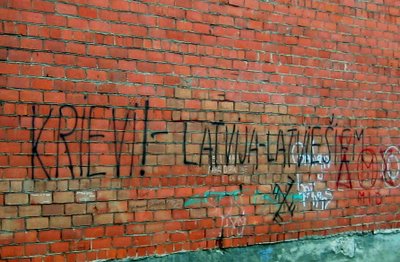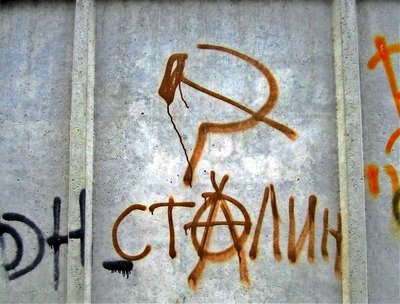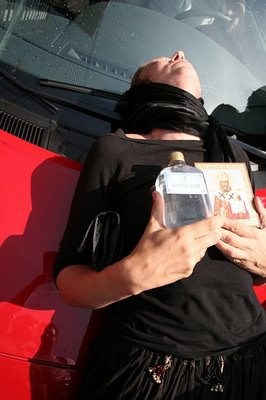"Glory to the Imperial Behemoth!"
 Darkness at Noon ran some photographs and descriptions of an anti-Estonian demonstration in Moscow, whence the slogan I am taking for the title of this post. Like most of Europe, Latvia marks the defeat of Nazism on 8 May. Russia celebrates the Soviet victory over fascism a day later, on 9 May (a day that is marked as Europe Day in Latvia, celebrating the Schuman Declaration of 1950 and not Stalin's victory five years before). The difference in dates is not trivial -- rather, the difference is part of what Oleg Ken of the European University in Saint Petersburg, Russia, describes as "un lourd héritage":
Darkness at Noon ran some photographs and descriptions of an anti-Estonian demonstration in Moscow, whence the slogan I am taking for the title of this post. Like most of Europe, Latvia marks the defeat of Nazism on 8 May. Russia celebrates the Soviet victory over fascism a day later, on 9 May (a day that is marked as Europe Day in Latvia, celebrating the Schuman Declaration of 1950 and not Stalin's victory five years before). The difference in dates is not trivial -- rather, the difference is part of what Oleg Ken of the European University in Saint Petersburg, Russia, describes as "un lourd héritage":Stalin's strategy of political technology was that of designing the historical memory of this and next generations by a preventive purge of the history itself. [...] By cutting corners and patching up some lapses, he established control over the memory of future generations. Of course, this could not be attained without the collaboration of Russian society, a willing hostage of its own superiority complex.Following the events in neighboring Estonia in the media and the blogosphere, one cannot help but be struck by the accuracy of Dr. Hist. Ken's analysis if we're to apply it to the flood of propaganda being poured upon Tallinn. Ken writes of "the theocratic dimension of the Soviet system." In Russia, the language never changed. Vladimir Socor, writing at Eurasia Daily Monitor:
Russian Minister of Foreign Affairs Sergei Lavrov denounces Estonia for “spitting on these values” [evidently Soviet ones] and behaving “disgustingly.” The Duma’s International Affairs Committee chairman, Konstantin Kosachev, accuses Estonia of “barbarism” and “lying.” These and other Russian officials mix the bullying language with the familiar neo-Soviet mysticism that defends “sacred” objects [the Bronze Soldier as a substitute icon] against “blasphemy” [by Estonian unbelievers in this case]. Those two key words are recurrent in Russian officials’ statements during this crisis.Though the dependably insightful Socor and some others (especially Shawn Macomber at The American Spectator) sympathize with the Estonian position, it's not only the homines sovietici and their offspring, primarily Russophones (whether extremists, nationalists, or even liberals like Yevgenia Albats [link in Russian]) who perpetuate a false view of history -- a falsified view, to be exact. The attempt to "balance" Stalinist distortions with historical fact, for instance in the style of Deutsche Welle, doesn't lead to balance at all, and the typical Western European (please forgive me for still using that term -- unfortunately, for Latvia [but less so for Estonia], "Eastern European" still fits) reaction to recent events tends to include a nod to "respect" for "the Russians' view," despite the fact that said view is very often infected with said lamentable, perverse, and intentional distortions.
Again, look at the language that's once again au courant. Not only did Estonia "desecrate" a tomb (by moving unmarked graves from a well-trodden bus stop to a cemetery following identification of the bodies and a church service?) -- Estonia is "rehabilitating fascism." Just for fun, I perused my collection of old Soviet history books this morning. I'm afraid that many of those who lacked the sacred privilege of indoctrination don't realize that "fascist" in the Soviet lexicon, and in the Russian lexicon today, is practically a synonym for "Balt." It might be difficult for the uninitiated Western European to distinguish between the broad terms that make Soviet historiography unreadable in their density -- "bourgeois," "anti-Soviet," "enemy of the people," "fascist." Maybe that's because the definitions are indeed indistinct. Let's move to verbs -- "rewriting" history. "Revising" the outcome of the War. Excuse me, but should we, in some perverse allegiance to the "theocratic dimension of the Soviet system," stick to Stalin's scriptures? The outcome of the War has been revised, Gott sei dank. The outcome of the War was the enslavement of half of Europe by forces directed from the Kremlin, where Lt. Col. Putin, a proud KGBeshnik who thinks the collapse of the USSR was "the greatest geopolitical catastrophe of the 20th C" rules today -- perhaps we should also pretend to see the fall of the Soviet Union as a catastrophe, here in the Baltics?
On 8 May, I always read Pēteris Ērmanis' poem about the rejoicing when the War ended -- driven into exile (like my parents -- my mother studied under him in a displaced persons camp), he wept; he saw and felt how happy everyone in Prague and The Hague and Paris was that the horrors brought about by Hitler and Stalin had ended, but he knew all too well that the horrors had only begun for his nation.
Many of the Russian propaganda sites, e.g., Komsomolskaya Pravda, stick to the scriptures -- indeed, scripture says that "the Great Patriotic War" started in 1941. Most of the monuments foisted upon us, like one of the memorials here in Daugavpils, bear that date as a beginning, graven in granite -- after all, according to that view, we were "bourgeois" and/or "fascists" until we "voluntarily" joined the Soviet Union. In reality (yes, reality) the Baltic states went to hell when Stalin colluded with his friend Hitler, 22 months before. The gruesome photographs I chose to illustrate this post are from Masļenki -- details here.
Unlike Nazi Germany, Soviet Russia was never defeated. It fell apart due to rot, and so Russia has never faced its history -- unlike Germany, it wasn't forced to. Most of the ethnic Russians in Latvia, like Russia the state, deny the occupation. The idea that we could "let bygones be bygones" doesn't hold water -- Giustino, when he wrote "How do they not know that their former prime minister Jaan Tõnisson was most likely executed by NKVD in 1941?" was sadly prophetic -- rioting Russophones in Estonia tried to torch a Tõnisson statue last week. The feeble crucifix erected at Masļenki was also set afire some time ago -- the location is now in Russia, and Latvia is about to legitimize that theft.
The illustrious analyst Atis Lejiņš called the day when the Latvian Parliament failed to produce a resolution supporting Estonia the darkest day in the history of our restored independence. It didn't stop there -- even the Writers' Union, once a cradle of the Awakening, failed to adopt such a declaration -- the poetess submitting the resolution, Margita Gūtmane (who heavily influenced me by her writing from adolescence), was derided as "a foreigner" (though she repatriated long ago), and Estonians were called, derisively, "Scandinavians" (this is, I suppose, what Ilves gets back for the nasty comments he made anent Baltic unity some time ago). I guess we're too busy selling out to care about our northern neighbor. Or -- not we but our Government. The film director Laila Pakalniņa read our Prime Minister's words over and over again -- we would like to be as sovereign as, asking whether this was a complex Fenno-Ugric grammatical form or recognition of the fact that we really aren't sovereign... her conclusion was that we could at least support Estonia's sovereignty, though we lack it and though Russia is displeased with its breadth and depth.
So here we are. Some are predicting a televized rebellion on "Victory Day." I think it deeply regrettable that there's so much blasphemy around -- do please forgive me for blaspheming the blasphemers! Russians, and the many others (many Balts included) whose loved ones died in the fight against Nazism, have every right -- and indeed the obligation -- to mourn and respect the sacrifices of their soldiers. The same rights and obligations that Balts (some Russians included) have to mourn the sacrifices of those who served in the Latvian and Estonian Legions in their fight against Bolshevism. What nobody has a right to do is to glorify the murderous imperial behemoth, be it Hitlerite or Stalinist. There is nothing sacred about the falsification of history.
Labels: estonia, fascists, great patriotic war, history, latvia, occupation, propaganda, russia, victory day, world war two






